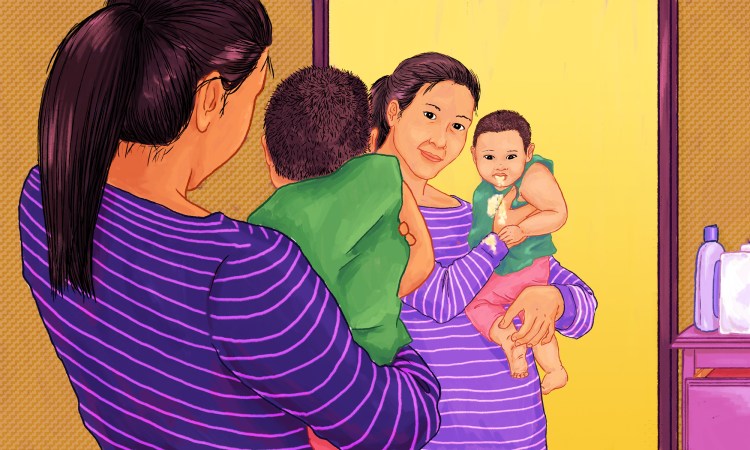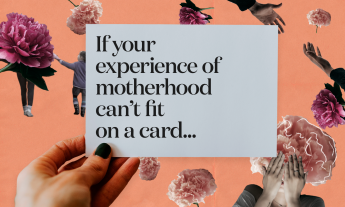
Thoughts like these are completely normal, but many moms feel ashamed of having them. Here’s how to let go of self-judgment and too-high expectations, from reproductive psychiatrists Alexandra Sacks and Catherine Birndorf.
I’ve have been working in women’s mental health for the past decade and my mission has been to educate people about the identity shift that occurs with motherhood, a phase called “matrescence.” Like adolescence, this developmental transition is hormonal, physical and emotional — all at the same time. But unlike adolescence, this transition hasn’t been part of the public discourse, and new mothers often end up judging themselves for these natural feelings. Of course, this conversation also includes the transitions of fathers, partners, and non-birthing parents. To cover the experience of matrescence from pregnancy through motherhood, I coauthored (with reproductive psychiatrist Catherine Birndorf, MD) the new book What No One Tells You; below is an excerpt.
If you’re interested in learning more about the subject and hearing real women’s stories, I invite you to listen to my new podcast “Motherhood Sessions,” where I sit down with mothers and share therapeutic conversations about guilt, perfectionism and many other human struggles. My hope is that by reducing stigma and shame around these topics we can all start to better understand the mothers in our lives — whether it’s yourself or someone you know and love. —Alexandra Sacks, MD
We often hear moms whisper in hushed tones something they’d never tell their friends or partner: “Sometimes I wish I had my old life back.” Or they wonder, “Am I a bad mother because sometimes I’d rather take a nap than nurse my baby?” These ambivalent thoughts are completely natural, yet many moms feel ashamed of them. We call this the push and pull of motherhood — sometimes you’ll feel pulled toward your baby’s needs and your identity as a mother, and sometimes you’ll want to push it all away.
Motherhood, like all complex experiences, is a mix of both positive and negative. Loving your child doesn’t change the fact that sometimes the work of caretaking is not fun. Yet for many moms, admitting that there are moments, days or weeks when you want a break is scary, because it can make you ask yourself: “Am I trapped with this feeling forever? What if I made a mistake? Does this mean I don’t love my baby?”
Ambivalence comes up when you find your attention is pushed away from your baby to care for yourself and others in your life, and you don’t know how to make it all work. With every choice, someone gets shortchanged. How are you not going to feel guilty about leaving a meeting at work to go to the pediatrician? Or sleeping an extra 15 minutes while your baby is fussing, only to find him lying in spit-up? And what about when you’re with the baby but really thinking about returning a friend’s call, replying to a work email, eating dinner with your partner, or sleeping?
Shame is when you conclude “I don’t have what it takes to be a good mother.”
Guilt, like ambivalence and worry, may be an inherent state of motherhood. Sometimes it comes from comparing yourself to an unrealistic ideal, but it can also be a clue that you should reassess your choices. If you feel guilty because you’re consistently late to pick up your daughter from daycare, for example, it may be time to talk to your boss and rearrange your schedule, or find someone else to pick her up.
But shame is a different thing. While guilt is feeling bad about something you did, shame is feeling bad about who you are as a person. Shame is when you conclude “I don’t have what it takes to be a good mother.” It can make you isolate yourself from the support of other moms.
Different people can react to the same experience with shame or with guilt. One mother might feel guilt for being on her phone while she’s with the baby, so she commits to making more of an effort tomorrow. Or she may decide that even though her choice is imperfect, it’s working for her. Another mother might feel shame, because she thinks that looking at her phone means she doesn’t love her child enough and there’s something wrong with her.
Whenever you identify that you’re feeling shame, realize this: Feeling bad about an experience does not make you a bad person. Life is about learning from our experiences, and you can choose differently next time.
Most new mothers have said to us, “I don’t know where the day goes.”
No matter how much you love your baby, there may be times when you feel like her servant. Ironically, your entry into parenthood may, even subconsciously, remind you of the powerlessness of your own childhood; for a while, you lose control of your time. Most new mothers have said to us, “I don’t know where the day goes.”
Many of our patients have unrealistic expectations about what they can accomplish with a baby. Some think that motherhood will be the start of a new, super-efficient phase in which they’ll go to the gym at 5 AM before the baby wakes up or send thank-you notes within 24 hours of receiving a gift. Others expect to continue their pre-baby routine, getting work done during naptime and running errands with an infant strapped to their chest. In our experience, the higher the bar you set, the easier it is to feel like you’re failing when you can’t reach it.
When moms hold tight to an idealized vision of what they can accomplish, they end up projecting their disappointment and anger onto their babies. One patient yelled at her baby for throwing up right after they left the house because “we didn’t have time to go back home and start all over again.” But when she caught herself blaming her baby for, well, being a baby, she felt guilty for her misdirected frustration. Our advice to her was to surrender to the experience. She learned to make plans that could be changed or broken and to remind herself that these feelings of timelessness and chaos was temporary and would change when her baby was older.
Mastery is the feeling of having accomplished something, of knowing what you’re doing and doing it well. It’s also an important component of self-esteem. But caring for a baby is the opposite of mastery. There’s no sense of accomplishment to be found when a onesie gets dirty within a few minutes, or when a fed baby is hungry again in two hours.
We recommend you look for small, discrete tasks that you can accomplish with little struggle. Think small: clear off the coffee table or do a few minutes of stretching. Focusing on small accomplishments can help you feel less frazzled and out of control.
If you finish a day and think “What have I accomplished?” remember you’ve accomplished a lot if you kept your baby alive, fed and clean-ish.
Every day, your list of priorities may change. Some days, the only thing will be to survive. As one patient said, “Learn how to tolerate that you can’t do it all. If you finish a day and think ‘What have I accomplished?’ remember you’ve accomplished a lot if you kept your baby alive, fed and clean-ish.” Clean-ish, not clean.
Experienced mothers will say: Get comfortable with things being messy (figuratively and literally). Babies go through diapers, wipes, clothes and more at a dizzying rate. This can be difficult for those of us who are calmed by a well-managed home. When you say to yourself, “It’s 4pm, I should have cleaned the house already today,” try to think about where that expectation is coming from. You could be comparing yourself to an idealized image of another mother’s life.
Trust us: most new mothers believe that other moms are “doing it better.” When you see another mother and feel subpar, please know that chaos in early motherhood is universal. You just can’t see it from the outside.
Excerpted from the new book What No One Tells You: A Guide to Your Emotions from Pregnancy to Motherhood by Alexandra Sacks and Catherine Birndorf. Copyright © 2019 by Alexandra Sacks and Catherine Birndorf. Used with permission of Simon & Schuster, New York. All rights reserved.
Watch her TED Talk now:












